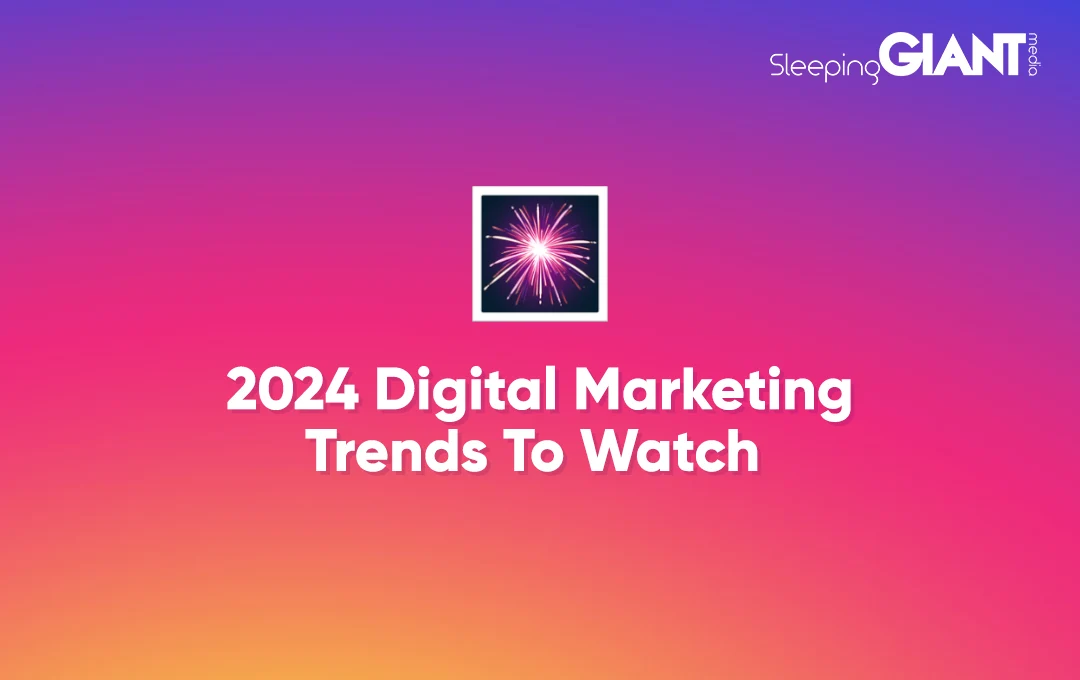
2024 Digital Marketing Trends To Watch
Digital continues to present both challenges and opportunities for businesses striving to stay ahead in their marketing efforts — and 2023 certainly was no exception.
From the increased integration of AI into platforms and tools to shifts in consumer preferences and habits, it’s safe to say there has been a staggering amount of growth and development over the last 12 months.
But, what’s to come? From Search Generative Experience launching, to entities eclipsing keywords, there are some big changes on the horizon for 2024 and beyond. Keen to keep our finger on the pulse when it comes to digital developments, we asked our experts what trends businesses and agencies can expect to see in 2024.
Read on to find out what they said.
Find the trends for you
To make things easier for you, we’ve grouped our predictions into categories. Use the jump links below to navigate to the section you’re most interested in reading about, or read through them all at your own pace if you’d prefer.

SEO
We feel for SEOs this year, we really do. Right up until the November Core Update, Google has kept throwing algorithm updates out there for SEOs to understand, navigate, and implement in order to maintain rankings. And it hasn’t been an easy task.
But what can we expect to see from SEO in the New Year? Something big is coming as Google celebrates its 25th year… the Search Generative Experience (SGE), bringing with it what is now being called ‘Entity SEO’.
Entity SEO
If you missed our explanatory blog, give that a read first to get to grips with the implications that this new style of SERP (search engine results page) will have for SEO, structured data, and content marketing.
As Head of SEO, Kathryn Bevan, says: “Entity SEO-focused approaches with content and structured data are likely to continue seeing good results into 2024 as Google further evolves their Search Generative Experience.”
Breaking this down a little, we can expect to see the following changes:
- Content ideation and creation may change slightly, being centred more around optimising and writing for entities rather than keywords and average monthly search volumes (or AMSVs).
- Link building may no longer be necessary, as Google understands “brands” are entities, so any mentions of your brand, whether linked or not, all add to its Knowledge Graph.
- Internal linking, on the other hand, is likely to become more important than ever as, if you don’t link your entities together with internal links as well as structured data, the relationship between them won’t be as clear to Google as it should be.
- Structured data will soar in importance. It can be used to strengthen the entities on webpages, as well as help to create relationships between entities that Google wouldn’t otherwise necessarily recognise on its own.
Custom structured data
We think that the last point deserves a section of its own, as structured data and technical SEO are now more important than ever, particularly the creation of custom structured data.
Our Senior Technical SEO Lead, Kelly Sheppard, explains:
“Google’s Knowledge Graph uses structured data to understand entities and the relationships between them. By writing bespoke entity-based structured data we can “talk” to the Knowledge Graph, which will play an essential role when Search Generative Experience comes into play.”

User-first content
We cannot emphasise the importance of user-first content enough. A key outcome of the countless SEO updates in 2023 — from September’s Helpful Content Update to October’s Spam & Core Update — has been an increase in the importance of people-first content. And we can expect to see this importance continue to strengthen in 2024.
As Kathryn explains: “Focusing on E-E-A-T and delivering people-first content will continue to be even more important going into 2024. We have seen a rise in user-generated content as part of Google’s focus on “hidden gems” in their latest core updates at the end of 2023, indicating that first-hand experience is key to ranking well.”
Topical authority
Similarly, as a result of all the updates, topical authority now reigns supreme as one of the most influential ranking factors for content — and we predict this will only become stronger.
Nikki Goodman, SEO lead, had the following to say about topical authority:
“When Google looks for the answer to the user’s query, it will source the highest quality answers from the most authoritative content/sites – which is another reason why entities will be very important, especially when tying the content back to the experts within the business”.
That being said, the greater your site’s and content’s authority, the higher the chances of your content being seen by users for related queries. This means that anyone who has authoritative content has the chance to rank, not just the most popular businesses, as it’s experience and authority that Google is seeking.
On this, Junior Creative Lead, Rosie Parry-Thomson, said: “SGE & E-E-A-T combined may see the rise of the small blogger and more niche pages. Historically, these have largely been outranked by big businesses but, providing they are able to give genuinely helpful answers, advice, and insights, they may find it easier to rank – with SGE focusing on providing the most hyper-relevant answer and pulling from various sources.”

Proving value in SEO will prove harder …
Lastly, though, we may expect to see an increase in difficulty when it comes to proving value in SEO. Under the Search Generative Experience, users are encouraged to remain on the SERP and not navigate to other sites, since all the information they need will be presented to them in the form of an AI-generated entity snippet.
As such, there is likely to be less organic traffic to sites in the form of link clicks from the SERP. Nikki tells us about the increase in zero-click searches, discussing how tests have actually shown a decline in aggregate organic traffic between 18 and 64%.
Content marketing
While we’ve already touched on some content trends in the SEO section (since it is hard to separate these two disciplines), it is worth considering the trends content writers should look out for in 2024 in isolation too.
AI & content quality
Up first, we simply cannot ignore the speed at which AI-generated content is developing. 2023 was characterised by AI — as a buzzword, as an opportunity, and even — at times — somewhat of a moral panic.
But how will things evolve in 2024?
Senior Creative Manager, Liz Quinn, says:
“I’m expecting to see a push towards quality over quantity when it comes to content in particular. AI is giving anyone and everyone the capability to create reams of low-value content on demand, which consumers will be wary of, so high-quality content is a way to stand out and build trust’”.
It seems logical that the AI expansion phase requires another, more refined, phase of stabilisation and ‘clarification’, surely?
Liz continues:
“My gut feel is we’ll see the AI craze dwindle a little. We’ve already seen some interesting articles around the idea that AI-generated content will rise before flattening out, when people realise it’s hard to differentiate, validate, verify, attribute, and authenticate. Online users already struggle with trust, and AI-generated content is not likely to help matters.”

Authenticity
Similarly to the rise in importance of topical authority and user-first content, we predict that authenticity will also reign supreme for content in 2024.
Rosie speaks at length on this topic, explaining:
“Authenticity continues to be hugely popular as a concept. With constant access to information and social media, users are more easily able to find and call out errors or misjudged decisions made by brands. If brands aren’t living their purported values (think diversity, inclusion, and sustainability), they will be found out. I’m thinking here about recent events, such as the boycotting of Zara in response to their marketing campaign imagery.”
“On the other side of the same coin, though, there is a large portion of consumers willing to turn away from malpractice for the sake of convenience. So, we may see larger campaigns from big businesses about sustainability/fair pay initiatives – mainly for the sake of satisfying users’ consciences, rather than necessarily embodying those things.
Small to mid-sized businesses or even single content creators may find themselves under scrutiny if they don’t come across as authentic or are simply not seen to have a strong set of values. 2022’s de-influencing trend set the scene here. Users will expect brands to position themselves as people, so thinking of your brand in these terms will prove helpful in tapping into your values and authenticity.”
It seems, then, that brands will need to really up their game when it comes to the following:
- Transparency
- Sustainability
- Values, missions, and goals
- Partnerships
- Their people
- Genuineness
- Honesty
- Originality
- And so many more.
Storytelling
Feeding into the authenticity point, we predict an adjacent rise in the significance of storytelling for brands.
In order for an organisation to speak to its audiences at a level that connects with them, it must first take them on a journey — awarding users a chance to peek behind the curtain before they purchase or convert. This can be in the form of holistic marketing campaigns, or even just longer-form, more personable content
Liz agrees, stating:
“I think brands are going to need to focus more on creating ‘experiences’ for the audience; not just a piece of content or a video, but a whole joined-up narrative. Storytelling, events, video, interactivity and personalisation could all play major roles here.”

Writing for SGE
As we touched on above, content writers will also have to adapt to the requirements of the Search Generative Experience. And what might this look like?
Let’s break it down.
– Question/answer based results. SGE will change the way that users interact with the SERPs. With immediate answers at the user’s fingertips, they are less likely to need to click through to a website. We envision that there will be another arm to content strategies where it’s no longer just functional and creative, but also a Q&A-based content strategy that is easy for AI to pick up, digest, and serve in the results. This will mean a bigger focus on structured data.
Account Director, Tiffany Fowler, agrees, stating:
“We may potentially see longer tail queries and question-based content rise in importance in 2024, feeding people into that top of the funnel to develop general brand awareness.”
– About Us & brand content.
“We predict a rise in the importance of the ‘About Us’ page, a previously overshadowed part of a website’s navigation menu. For brand entity SEO, having a strong hub of information about your organisation, its history, people, products, location, and services is essential. And where can Google expect to find this information? On About Us pages. For content writers, 2024 is going to involve a whole lot of brand content strengthening for this reason.” – Kitty Bushell, Senior Creative Executive.
Lastly, we have to nod towards the evolving trends in content production. Often referred to as content extraction, the way brands are obtaining content is set to change.
More and more, wider teams (and not just specific content writers) are having a hand in content production. Why? Because of E-E-A-T. Google has asked for more expertise and experience in content, and businesses and agencies are answering. By combining the specialist knowledge of teams with the dexterity of content writers, it is much easier to produce E-E-A-T-friendly content.
In our recent Marketing Leadership Series, Account Director, Tiffany Fowler, spoke with CEO, Luke Quilter, about this trend, stating that it is essential to extract “thought-leadership-based content” from your teams and build this into “a holistic strategy” that runs across multiple channels.
This brings us to another, smaller trend that we expect to see: content amplification and atomisation. That is: the repurposing of content across multiple platforms and channels in order to extend its lifespan and reach.
More of a visual learner? Watch Tiff’s and Luke’s trends conversation unfold by accessing the full recording now!
Data & Tracking
When it comes to tracking, there has been a steady stream of changes for data teams to keep up with — for one, simply measuring the impact of all of the updates listed above. But also, an increase in AI-driven analytics, developments in tools, and an increased focus on user privacy, too.
Building on this, when asked “what aspects of data analytics do you think will be most important in shaping marketing strategies in 2024?”, our experts also honed in on leveraging first-party data for targeting and personalisation.
We asked our experts to build on these foundations and suggest what they expected to see in the New Year. Here’s what they said.
Big Query
Data Lead, Kendyll Elliott, picked up on the increased use and capabilities of Big Query, a serverless analytics platform developed by Google Cloud. On this, Kendyll said:
“We expect to see an increase in Big Query Analysis in the new year. Particularly as we develop our GA4 schema, and extract the UA data that Google will be taking away at some point.”
The historical data available in Universal Analytics will be made inaccessible by Google from the 1st of July 2024 — so data teams have their work cut out for them in order to make sure their clients have all successfully transitioned to GA4 – and that no data will be lost after this date.
Cookies
Another huge feature impacting the work of data teams everywhere in 2024 is cookie changes. Google announced that it will start to phase out third-party cookies in the first quarter of 2024. This will begin with Chrome disabling these cookies for about 1% of users in Q1, ending with 100% of users by Q3.
Read our blog on what a cookie-less future might look like for websites and learn how to prepare for this change.
In terms of the implications of no more cookies, Kendyll says:
“This will require different ways of tagging marketing platforms. We are already looking at different forms of tagging like Server Side tagging.”

Organic social media
From influencers to TikTok trends, organic social media is perhaps the most in-flux marketing channel out there. So, pinning down predictions is notoriously difficult. That being said, looking at user behaviour and engagement over the past 12 months has led to some interesting conclusions.
TikTok search
Ben Hawkes, Senior Paid Manager, has the following to say about the advancements in TikTok search:
“I am old enough to say that I don’t really get how people use TikTok to do research and find out about products, but if we look at the data, that is exactly what’s happening. Anyone who is selling products or services in a B2C space, particularly if their target audience is under 35, needs to be looking at their TikTok strategy in 2024 – and making sure they have a strategy that incorporates search trends, and answers search queries.”
You heard Ben! TikTok needs to be at the forefront of your 2024 marketing strategy, otherwise, you run the risk of getting left in the digital dust…
User-generated content
Perhaps owing to the sustained popularity of TikTok, a platform where users are encouraged to film their own videos, we should also expect to see more user-generated content.
So, put your feet up, brands, users are going to film ads and product reviews for you. Well, not quite, there will still need to be some major input from businesses, especially in the form of community management and engagement with their audiences in comment sections.
As Rosie says:
“We expect to see more video content and more multimedia / interactive content, namely, ‘meet the public’ trends (like interviews or talking heads). How brands are seen to be interacting with people continues to be vital.”

Paid Media
Finally, we come to PPC (Pay Per Click) and other paid media. It’s safe to say that the defining change across 2023 for this digital marketing service has been AI interaction. Let’s leave the explanation of this to the experts, shall we?
AI & Audiences
Take it away, Ben.
“I think 2024 will continue to see generative AI used alongside more regular day-to-day manual actions and strategy work. Much like the AI tools themselves, AI functions are likely to use pre existing content to bulk out, speed up, or automate manual functions.”
We agree so far ….
“One of the key areas that AI has already seen huge growth in marketing is in the world of audience building. By analysing multiple data points, and being able to process huge amounts of data simultaneously, AI has huge potential when it comes to fast-tracking audience creation and profiling. This is especially important in a time when data restrictions and cross-platform data sharing are becoming more challenging to manage. We have already seen most paid channels step up their AI audience creation, and this is only likely to continue and be prioritised even more by the channels themselves.”
Nicely put.
Wider digital marketing trends
While we covered trends for the specific channels that fall under digital marketing, what about the trends and changes that all marketers can expect to see?
You know, those things that don’t really fall comfortably into a select discipline, but that we all need to be doing? We’ll cover those now. In their conversation about trends during the Marketing Leadership Series, Tiff and Luke checked off plenty of general marketing predictions for 2024, touching on everything from strategy to holistic approaches. We’ve summarised their core findings below.
Strategy and joined-up thinking
As Tiff puts it:
“Strategy is absolutely paramount to making sure that you’re performing on your digital platforms […] I think that, if your platforms are disjointed, you’re not going to get the value from them that you would like.”
So, plan ahead, foster a collaborative approach from your teams, and plan multi-channel campaigns. Think about it like this: if you’re lifting a table on your own, it’s heavier than if you and three friends share the burden. One channel won’t bring in the results that four working together will.
Content leveraging
Make the content you’ve got work harder for you. Similarly to the above, Tiff uses a great example of clients that she’s worked with who could be better utilising the marketing materials they are putting out there.
“I know that there’s some businesses who come to us and we do a bit of an assessment on what they’re doing. They’ve got some amazing content on TikTok, but they’re not posting them on Instagram Reels — and you think that’s such a missed opportunity. You’ve already got it kind of sitting there ready to go. So, I think leveraging the content you’ve got across different platforms makes so much sense for your brand.”
Testing tools and leaning on industry knowledge
While this point is geared more specifically towards larger in-house marketing teams and agencies, it applies to everyone. 2023 has been completely characterised by change and digital evolution. And the best way to stay on top of this — floating not sinking — in 2024? To embrace, test, and lean on the knowledge of your teams.

As Tiff puts it,
“I think for marketing managers, being looped into things is going to be important — just to touch base, to give you the highlights. I think as an agency we’re so lucky to have such a breadth of industry experts.”
And it’s these industry experts that should help carve out strategies and tool usage with insight and data-driven decision-making in 2024. With the advent of AI churning out endless tools and tricks, it also becomes essential to firm up a process for gleaning:
A) Which tools can help you and with what marketing efforts?
B) What are the comparative benefits of these tools?
Tiff focuses on this point, arguing:
“I think it’s trying to develop a criteria to say, ‘Right. This tool to do this, and then what’s the benefit for doing it?’. You evaluate before you even start, then you test it and evaluate it. And, then, if it’s valid, you roll it out’.
Keen to keep up with trends?
So there we have it. Whether you’re a one-man-band, running marketing activity for your own business, or an in-house social media manager, responding to trends can seem like an impossible task.
Don’t panic, though. We’re here to help. Not only do we regularly produce expert blog content that breaks down the latest marketing movements into digestible chunks, but we also offer Marketing Leadership Series & Digital Skills Workshops to cover all the latest happenings in the industry.
Interested in levelling up your activity in one certain area in response to these trends? For example, perhaps you want to produce more E-E-A-T-friendly content, or organic social media posts that pave the way for user interaction. Then get in touch with our experts to find out more about our range of digital marketing services — from PPC to SEO.
Blog
Everything you Need to Know About the March Core Update
We knew it wouldn’t be long before Google released their first core update of...
Giant Wednesday
How To Optimise Images For Websites
Digital Marketing, technology & business insights, how-to's and explainer...
Follow Us
Sign Up For More
Stay up to date with the latest happenings, learnings, events & more with our GIANT Newsletters.
Contact Us
Top Floor, The Civic Centre, Castle Hill Avenue, Folkestone CT20 2QY.




